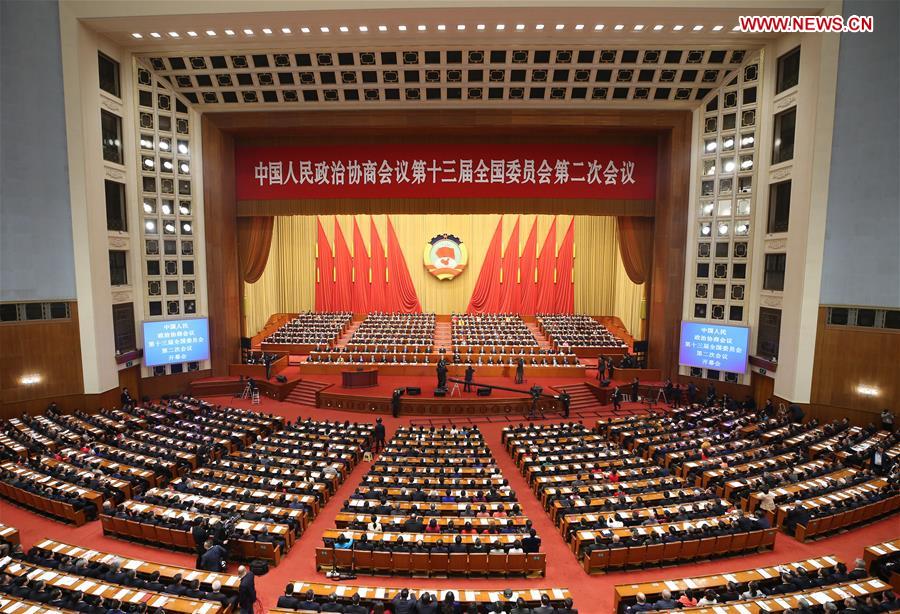China's major political season to gather momentum for achieving Xiaokang
Xinhua2019-03-04 21:10

The second session of the 13th National Committee of the Chinese People's Political Consultative Conference (CPPCC) opens at the Great Hall of the People in Beijing, capital of China, March 3, 2019. (Xinhua/Yao Dawei)
BEIJING, March 3 (Xinhua) -- China's top political advisory body started its annual session Sunday in Beijing, raising the curtain on a key political season, which also includes the top legislature's annual meeting.
Dubbed the Two Sessions, the season will rally support for securing a decisive victory in the country's bid to build a moderately prosperous society (Xiaokang) in all respects.
Xi Jinping, general secretary of the Communist Party of China (CPC) Central Committee, Chinese president and chairman of the Central Military Commission, and other Chinese leaders attended the opening meeting at the Great Hall of the People.
"Building a moderately prosperous society in all respects is a cause that benefits our population of more than 1 billion people," Wang Yang, chairman of the 13th Chinese People's Political Consultative Conference (CPPCC) National Committee, told more than 2,000 political advisors at the session.
China has set 2020 as the target year to win the tough battle against poverty.
Wang highlighted the importance of harnessing positive energy for securing a decisive victory in this goal.
Wang encouraged political advisors to focus on hotspot and difficult issues, promptly identify potential risks and dangers, and proactively report on social conditions and popular sentiment, so as to provide the Party and government with valuable proposals and suggestions to help resolve issues and defuse risks.
Describing the formidable tasks, the many problems, risks and challenges, and the complex demands involved in decisively securing a moderately prosperous society in all respects as "unprecedented in scale," Wang pinpointed the need to build consensus and unity.
There are still 16.6 million impoverished people in China's rural areas. More than 10 million people are expected to be lifted out of poverty in 2019, with 300 counties to get rid of the poverty tag.
"The poverty alleviation tasks this year are more focused on areas with abject poverty," said Ma Quanlin, a national political advisor. "The gatherings of the national legislative and political advisory bodies will blow the horn on the final battle against poverty, and will pave the way for the final victory."
In the work report delivered at the opening meeting, Wang Yang commended the political advisory body's work last year, saying new advances had been made under the strong leadership of the CPC Central Committee with Comrade Xi Jinping at its core.
"We gave full play to the CPPCC's role as a body dedicated to consultation and carried out our dual responsibility of offering suggestions and building consensus," Wang noted.
Over the past year, the Standing Committee of the CPPCC National Committee has focused on the central tasks of the Party and country and fulfilled its duties with commitment to pursuing unity and democracy.
Political advisors have conducted consultations with a focus on fighting the three critical battles against potential risks, poverty and pollution, and also on promoting high-quality development, according to Wang.
The CPPCC is an important organ for CPC-led multiparty cooperation and political consultation. It is a major channel for socialist consultative democracy and a specialist consultative body.
Its main functions are political consultation, democratic oversight and participation in and deliberation of state affairs.
A total of 5,571 proposals were submitted by the CPPCC National Committee members over the past year, with 41 percent of them focusing on practicing new development concepts, deepening supply-side structural reform, and promoting high-quality economic development.
As of Feb. 20, 99.2 percent of the proposals had been handled, said Su Hui, vice chairperson of the 13th CPPCC National Committee, when delivering a report on the proposals.
With regard to the CPPCC's major tasks in 2019, Wang said top priority would be given to studying and implementing Xi Jinping Thought on Socialism with Chinese Characteristics for a New Era.
The second task is offering high-quality suggestions on the central tasks of the Party and the country, which include completing the building of a moderately prosperous society in all respects and deepening supply-side structural reform.
Making greater efforts for unity and friendly ties is another important task, Wang said.
Other major tasks include contributing wisdom and strength to the major country diplomacy with Chinese characteristics, making solid progress in the self-improvement of the CPPCC, and holding celebrations for the 70th anniversary of the CPPCC's founding.
The 11-day national political advisory body's annual session runs almost in parallel with the annual session of the National People's Congress, China's national legislature, which is set to start Tuesday.
More than 2,000 national political advisors and about 3,000 legislators are expected to offer proposals and insights on running state affairs in the coming two weeks.
This year's gatherings are expected to garner more attention both at home and abroad as they shed light on how the country will manage to maintain stable and high-quality growth amid lingering downward pressure.
A government work report to the legislative session will reveal the nation's economic growth target and development plan for 2019.
On the agenda is also the deliberation of a draft law on foreign investment to be submitted for a third reading.
"The implementation of the new measures in reform and opening-up concerns China's stable growth, the people's wellbeing, the prevention of risks, and the country's overall development," said Wang Jing, a member of the CPPCC National Committee. "I expect the reform and opening-up to pick up pace in 2019."
